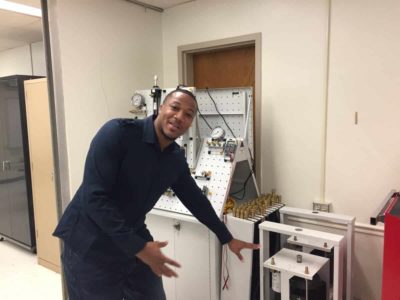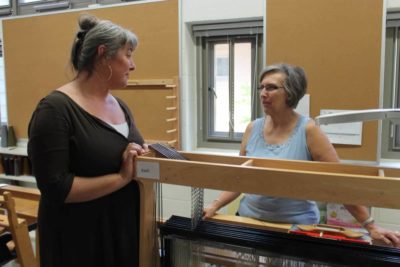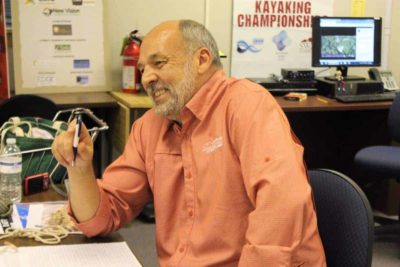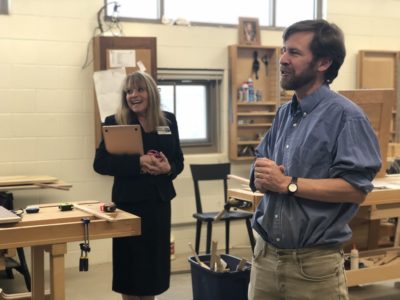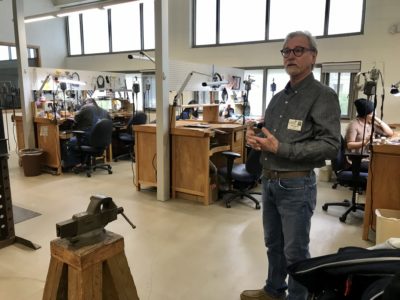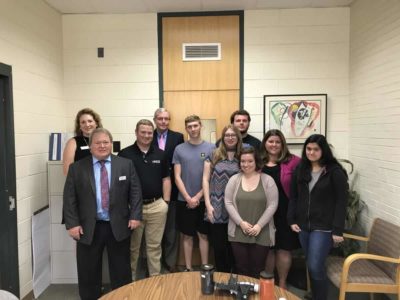“I never really even had a job that wasn’t education-related,” said Ashley Hagler, a biology instructor and director of undergraduate research at Gaston College. However, Hagler — the 2017 North Carolina Community College instructor of the year — didn’t always intend to become an educator. As an undergraduate, she majored in biology with the intention to go into infectious disease research.
After graduating, Hagler worked as a high school teacher and then as an adjunct instructor at several Charlotte-area colleges where she developed a strong interest in teaching college students.
“When I would try to go down a path in the field of education, doors were just opened,” she said. “I really enjoyed the younger students … they were just a lot of fun. But my passion is working with adult students. I tend to be more of a person who wants to create a partnership with my students.”
“I really have them take responsibility for their learning.”
A leader in undergraduate research
A group of instructors from Gaston College’s associate of science program came together to analyze the needs of their students. They found that the fall-to-fall retention rate at Gaston College for first-year students was roughly 45%. The college’s graduation rate for STEM majors was close to 16%.
“That number just didn’t sit right with us,” Hagler said. “We wanted to figure out things that would work better for them.”
The group then focused on how the college could increase retention specifically for STEM majors. Their research pointed toward creating classes that are engaging, include problem-solving, and are inquiry-based.
“We must have gone through thousands and thousands of papers,” she said.
Inquiry-based learning is a curriculum designed so that students gain the information they need through a method of questioning.
“So instead of the instructor standing up there, writing on the board, providing all the answers,” Hagler said, “the instructor is leading them through the process.”
The college created an initiative called SPARC: STEM Persistence and Retention via Cohorting, Centralization, Curriculum Change, and Collaboration, which Hagler now directs.
Hagler quickly embraced the new emphasis on research.
“I like to see them spinning their wheels, because then I know they’re really examining that problem,” Hagler said. “A lot of times, they’ll ask me a question, and I’ll say, ‘You know what — I don’t know that answer. Let’s, see if we can figure it out together.'”
Now, every class in the college’s associate of science program has an inquiry-based instructional method. Every science class includes some form of research.
Gaston College considers the program a success. Retention rates have increased from 45% to 63%, and graduation rates have increased by 300% according to a 2017 report by the college.
“It’s been a team effort. Like there’s no way … that we would have been successful if it had just been me working on it,” she said. “Every instructor at Gaston College has been supportive of what we’re doing.”
Gaston College has had a lot of success with its commitment to undergraduate research. But, according to Hagler, many other community colleges across the country have not yet adopted undergraduate research programs.
“Right now, I know of 60 of us (community colleges) that are doing undergraduate research as part of a true concentrated effort,” Hagler said.
Hagler thinks this is because there are many challenges to doing undergraduate research at community colleges.


“Because we are challenged and because we are charged with being teaching institutions, people in the past have not typically thought of research as a teaching tool,” she said. “Using undergraduate research is simply a method of pedagogy.”
Hagler has been meeting those challenges and innovating in her role at Gaston College since 2007.
“Until I took the job at Gaston, I really didn’t know much about the community colleges, but since I’ve been there, I really love it,” she said. “It’s home. I just have a passion for the students that come through.”
Her approach to teaching: Try something new, slowly make change
When asked what her advice is for teaching research in an undergraduate community college setting, she said to make change slowly.
When Hagler moved her science classes to be hands-on with no lectures, it was challenging to make the leap so fast. She wanted to remind others that they can make big changes slowly and gradually.
Other pieces of advice she shared include:
Try something new
“Try something new. It’s a scary proposition sometimes. And if that means you change one activity in one class, if it works, great. And if it doesn’t work, change something else. It should always be about making improvements in whatever you’re doing.”
The textbook is a resource, not a curriculum
“As much as we all hold dear to our textbooks, we should not let our textbook guide our curriculum. You as the instructor are in charge of what you are teaching. And so it’s time to take charge. It’s also a time to make some differences and change some things up if you want to.”


